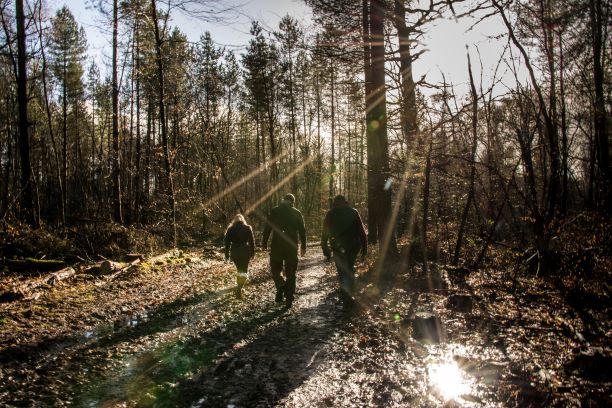Young people's climate anxiety is soaring due to lack of access to green space, says Woodland Trust

As part of a nationally representative sample, the survey by the Woodland Trust found deep concerns about the future among 16-24-year-olds, with almost one in four (24%) saying fears over the climate crisis mean they are willing to consider, or have already decided, to have fewer children than they would otherwise like.
Research showed that although seven out of 10 young people are worried about climate change and its effects, 86% of people surveyed felt that being outdoors and among nature had a positive effect on their mental health.
Woodland Trust chief executive Dr Darren Moorcroft said that, with access to woodland declining and tree cover in the UK one of the lowest in Europe, the results were “alarming”.
He said: “Young people are experiencing an epidemic of climate anxiety and are increasingly worried about the health of the planet. This new data shows that climate change is jeopardising more than just the environment, with people’s mental well-being and future life plans also affected.
“We know that being outdoors and among nature has a positive effect on mental health – but the level of access to green space in the UK is simply not good enough.”
The UK currently has just 13% woodland cover, only 7% of which is in good ecological condition, compared to a European average of 37%. The Trust’s groundbreaking State of the UK’s Woods and Trees report, published in 2021, also showed that only 16.2% of people in the UK had access to at least two hectares of green space within 500m of their home. This was down from 21.1% in 2016.
The YouGov poll, conducted in February 2023, showed that only 9% of people aged 16-24 felt young people have a great deal of influence making decisions about climate change.
The Woodland Trust has long recognised the importance of empowering the younger generation in climate conservation and put young people at the heart of the creation of the 400-acre Young People’s Forest at Mead in Derbyshire in 2018.
Elyse White, 22, who works for the Trust as a forest engagement and environment assistant at the Young People’s Forest, said being close to nature has had “a monumental impact on her life”.
“I suffer from anxiety but the Young People’s Forest has contributed massively towards the transformation of my confidence,” she added. “I turned to the environment and nature for comfort and distraction; this habit led to a life-changing therapy.
“I have gained the most valuable experiences, had opportunities to learn, to physically take part in the project and to meet new people who have the same interest in appreciating and looking after our environment.”
With climate anxiety an ever-increasing issue, Hayley Jarvis, head of physical activity for the mental health charity Mind, said outdoor activities can be a great way to improve mental wellbeing.
“Ecotherapy, a type of formal treatment which involves doing activities outside in nature, can be as effective as antidepressants in treating mild to moderate depression and anxiety,” she added.
“Unlike working out in the gym or other indoor activities, the colours, sounds and smells we find outdoors stimulate our senses in a different way and can boost our mood. Getting away from modern life and into a relaxing outside space can allow us to switch off from everyday pressures, help relieve stress, and give us time to clear our heads.”
The Woodland Trust has more than 1,000 woods across the UK. They are all free to visit and the perfect way to get nature therapy. To find your nearest wood just enter your postcode in the Woodland Trust’s handy wood finder tool
Along with improving our mental wellbeing, green spaces can help make us physically healthier too.
Nature stabilises blood pressure and its effects have even been shown to increase anti-cancer cells, reduce the incidence of underweight births, and accelerate recovery from surgery.
The Woodland Trust, the largest woodland conservation charity in the UK, has launched its ‘Plant More Trees’ climate campaign with a mission to plant 50 million more native trees across the UK by 2030 and create a greener, healthier world for people and wildlife.
Three quarters of all people surveyed in the YouGov poll would be willing to plant, or have already planted a tree, with only 9% saying they would not be willing to do this.
The Trust has already planted more than eight million trees of the 55 million trees they have planted since 1972, with young people and children.
Dr Moorcroft continued: “There is hope but we need to take drastic action. Woodland cover in the UK is desperately low and we want to see it increased to at least 19% by 2050.
“Trees and woods are integral to tackling both the nature and climate crises, but many young people miss out on both the physical and mental health benefits of being among nature.
“We know government recognise this and have ambitions to stave the freefall in nature by 2030, hit net zero by 2050 and give everyone access to a green or blue space within 15 mins walk of their home by 2030. All the targets are right but action is sorely missing.”


